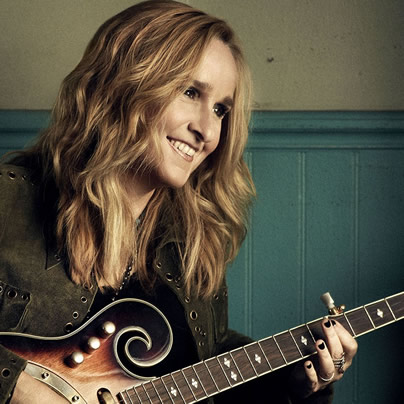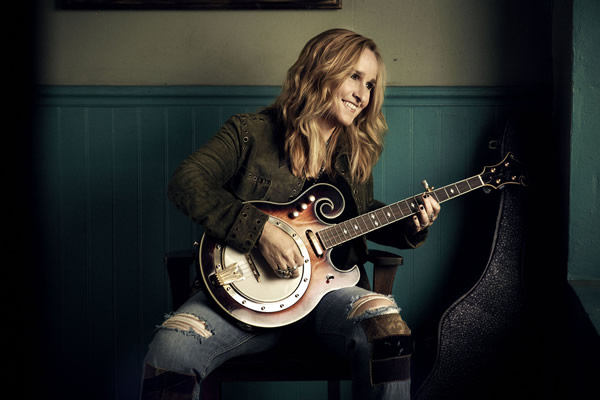Arts & Entertainment
Rippin’ & tearin’ & strippin’
Melissa Etheridge on Wolf Trap and why drastic health steps should be weighed carefully


Melissa Etheridge (Photo by James Minchin III)
Melissa Etheridge
With guest Eric Hutchinson
Tuesday
8 p.m.
Wolf Trap
Filene Center
1551 Trap Road
Vienna, VA
$35 (lawn)-$65
wolftrap.org
When we talked to Melissa Etheridge last year the conversation turned — as one might expect in an election year — to politics. So this time we focused on music. The lesbian rocker plays Wolf Trap Tuesday night. Her comments have been slightly edited for length.
WASHINGTON BLADE: Last time you were here you played the Strathmore, which is kind of stately, whereas Wolf Trap is outside and more earthy. Does the venue affect the kind of show you play?
MELISSA ETHERIDGE: Yes, totally. One of the things I do before I even write out a set list is I go stand on stage and look out and really get a feel for what the venue is like. Is it indoors, outdoors, is the first row up close, will people be able to stand, are they soft seats, hard seats? I’ve been touring for 25 years so I’m very conscious of what kind of show can be produced at each place and it does make a difference in what songs I play. This will definitely be different from the Strathmore show. I love playing Wolf Trap and I don’t think I’ve ever sweated as much on stage as when I’ve played Wolf Trap. It was just so humid last time I was there, I was really soaked even before the show. But yeah, it’s gonna be much more rock and roll out there.
BLADE: How do you manage to do those big rock money notes year after year? Rock singing, of course, often doesn’t use proper vocal technique that they teach you in classical singing and some singers get vocal cord nodules while others, like Tina Turner perhaps or many gospel singers, seem to be able to growl and howl for decades on end with no problem. Have you ever strained your voice letting it rip so to speak?
ETHERIDGE: I learned a long time ago playing in bars how to make that growly rock and roll sound but not harm the vocal cords. It’s not really screaming, it’s like a stage scream. That and having a good understanding of how not to tax the voice too much in doing that style of singing, also helps. I usually don’t sing more than three night in a row. I can do four, but it will start to wear down after awhile and the shape of my voice is definitely related to everything. If I’m tired, if I haven’t eaten right, if I’m stressed, all those things affect it. But as long as I can eat right and sleep well, I can be on the road and do the rock and roll stuff out there every night.
BLADE: How have you found the right balance throughout your career of knowing when to play up the all-out rock stuff versus having enough of a commercial, pop/AC vibe on your various projects to get some radio and mainstream exposure? Have you given much thought to those sorts of things as you’ve been writing and recording various records?
ETHERIDGE: Yeah, it’s been a big part of understanding radio and the music business in general and then just when you kind of have a handle on it, of course it changes much like it did in the mid-‘90s when I was really at the pinnacle of it. As it should — young kids grow up and they have their own stuff and I get that. I stopped, I guess around the turn of the century, trying to make my music for radio because I think that would just have been selling myself out and I realized I had a strong live audience that was not going away and would still come see me play, so I really dedicated myself to making the music that I love and not trying to be so much pop. Which is fine — I mean, I love a good pop song like everybody else does, but I don’t limit myself to that anymore. The most important thing in my mind when I’m writing and recording is how is this going to translate to the live stage. That’s more the guideline.
BLADE: And yet many veteran acts who have that loyal fan base have great numbers the first week out with a new album and like you said, do fine filling decent-size venues, yet without any radio traction, the albums can come and go so quickly it seems. Has there been any frustration with that at various times? Any sense of a diminishing return for all the hard work?
ETHERIDGE: Well yeah, of course you always hope there’s maybe something there radio can hold on to a little and you would always like to make your record company a little money, that’s always nice. Yet I really have learned to let it go because I think the music does sort of manage to find its own way. I just stumbled on some online music site where these two rock critics were saying my last album “4th Street Falling,” that if it had been released by some up-and-coming singer, it would have really represented kind of the future of rock and roll or something so yes, there is sometimes an advantage to being not as established but I wouldn’t trade where I am at all to be up and coming. I’m very happy with where I am overall and I feel I have a great deal of industry respect and I’m fine with that.
BLADE: You’ve been on Island your whole career, which is almost unheard of in this day and age. I’m sure the whole staff has changed since you started …
ETHERIDGE: Not a single person is still there from then.
BLADE: How have you navigated all the changeover?
ETHERIDGE: It’s funny, there was a joke a few years ago there that everytime I had a new album out, “Oh, watch out, Melissa’s got a new one, there’s going to be a complete regime change.” Different times my options have been up we’ve looked around and, you know, Island and Def Jam and Universal — it’s one of the biggest labels there is. I always felt I had good relationships there so why not? The whole business has changed so much, it’s nice to stay someplace if you can.
BLADE: Last time you played here, the album was just out. Do you feel freer to sing more of it live now that it’s been out awhile and people have had time to let it sink in or do you skew more hit-heavy for the summer shows?
ETHERIDGE: Last fall I did kind of the “4th Street Falling” tour and I did a lot of new stuff but at that stage, I’m still listening to the new stuff, experimenting a bit and finding out which songs seem to pop more live. So I kind of play the new stuff and see which cuts were really fun for the audience and they tend to stay in the show. But yeah, it’s a summer show — we’re going to be doing all the hits too. We’ll be singing “Come To My Window” at the top of our lungs.
BLADE: You had so many great TV duet shows over the years in terms of collaborations with other artists — Joan Osborne, Sophie B. Hawkins, Jewel, Dolly Parton. Any of those especially stand out in your mind?
ETHERIDGE: Well singing with Bruce Springsteen was a dream come true. It was like, “Oh, please let time stop.” That one and singing with Dolly was just one of the greatest things that ever happened to me. I felt like our entertainment ethics were the same. She’s such a great entertainer and we kind of threw things back and forth. It felt like a good game of one on one.
BLADE: One that I really remember was when you sang “You Can Sleep While I Drive” as a duet with Amy Grant. Here she was this gospel singer singing a sweet duet with you, which sort of gave it a lesbian undercurrent. It seemed kind of shocking at the time. Do you remember how that came about or if there was any hesitation in her camp to do it?
ETHERIDGE: Trisha Yearwood had covered that song sometime in the ‘90s, so it had kind of been in the country world, then when Amy came in and we were talking about songs we could do, she said, “Well, I want to sing ‘You Can Sleep While I Drive.’” I’ve sang that with more people than any other song. It just kind of lends itself to that harmony duet feeling. I’ve known her for a long time. I met her in Europe back in ’88 and have been friends with Vince too. You know she kind of went through her own tabloid-y thing but she’s just so open and very very easygoing so that wasn’t even part of it. It was just like, “Let’s sing together and just enjoy it.”
BLADE: How prolific have you been in the studio over the years? Did you overcut tracks for very many of your albums? Is there going to be a killer Melissa Etheridge box set of outtakes and rareties someday?
ETHERIDGE: I can’t believe you asked that because yes, I’m working on that right now. The record company came to me and said, “You know, it’s been 25 years, let’s put out a box set.” But I didn’t want to just say, “OK, here’s my songs again.” I think my fans will enjoy some of these other things so I started going back into the vaults and into my storage space and found some tapes I hadn’t even remembered. So it’s going to be eight CDs and there’s live tracks, covers, solo demo tracks, a recording of me made when I was 14, everything that didn’t make it onto an album, pictures and videos. I even found a TV show I did back in 1982 in L.A.
BLADE: ETA?
ETHERIDGE: I don’t know the exact date right off, but it will be in November.
BLADE: Where do you keep your Grammys, platinum albums and Oscar?
ETHERIDGE: I have a lovely office I share with my gal, Linda.
BLADE: You and Linda (Wallem) are still together?
ETHERIDGE: Oh yes, yes, yes. I finally got it right. It’s a bunch of things. It’s a grown-up relationship.
BLADE: As a breast cancer survivor yourself, what did you think of Angelina Jolie’s announcement?
ETHERIDGE: I have to say I feel a little differently. I have that gene mutation too and it’s not something I would believe in for myself. I wouldn’t call it the brave choice. I actually think it’s the most fearful choice you can make when confronting anything with cancer. My belief is that cancer comes from inside you and so much of it has to do with the environment of your body. It’s the stress that will turn that gene on or not. Plenty of people have the gene mutation and everything but it never comes to cancer so I would say to anybody faced with that, that choice is way down the line on the spectrum of what you can do and to really consider the advancements we’ve made in things like nutrition and stress levels. I’ve been cancer free for nine years now and looking back, I completely understand why I got cancer. There was so much acidity in everything. I really encourage people to go a lot longer and further before coming to that conclusion.
Books
Love or fear flying you’ll devour ‘Why Fly’
New book chronicles a lifetime obsession with aircraft

‘Why Fly’
By Caroline Paul
c. 2026, Bloomsbury
$27.99/256 pages
Tray table folded up.
Check. Your seat is in the upright position, the airflow above your head is just the way you like it, and you’re ready to go. The flight crew is making final preparations. The lights are off and the plane is backing up. All you need now is “Why Fly” by Caroline Paul, and buckle up.

When she was very young, Paul was “obsessed” with tales of adventure, devouring accounts written by men of their derring-do. The only female adventure-seeker she knew about then was Amelia Earhart; later, she learned of other adventuresome women, including aviatrix Bessie Coleman, and Paul was transfixed.
Time passed; Paul grew up to create a life of adventure all her own.
Then, the year her marriage started to fracture, she switched her obsession from general exploits to flight.
Specifically, Paul loves experimental aircraft, some of which, like her “trike,” can be made from a kit at home. Others, like Woodstock, her beloved yellow gyrocopter, are major purchases that operate under different FAA rules. All flying has rules, she says, even if it seems like it should be as freewheeling as the birds it mimics.
She loves the pre-flight checklist, which is pure anticipation as well as a series of safety measures; if only a relationship had the same ritual. Paul loves her hangar, as a place of comfort and for flight in all senses of the word. She enjoys thinking about historic tales of flying, going back before the Wright Brothers, and including a man who went aloft on a lawn chair via helium-filled weather balloons.
The mere idea that she can fly any time is like a gift to Paul.
She knows a lot of people are terrified of flying, but it’s near totally safe: generally, there’s a one in almost 14 million chance of perishing in a commercial airline disaster – although, to Paul’s embarrassment and her dismay, it’s possible that both the smallest planes and the grandest loves might crash.
If you’re a fan of flying, you know what to do here. If you fear it, pry your fingernails off the armrests, take a deep breath, and head to the shelves. “Why Fly” might help you change your mind.
It’s not just that author Caroline Paul enjoys being airborne, and she tells you. It’s not that she’s honest in her explanations of being in love and being aloft. It’s the meditative aura you’ll get as you’re reading this book that makes it so appealing, despite the sometimes technical information that may flummox you between the Zen-ness. It’s not overwhelming; it mixes well with the history Paul includes, biographies, the science, heartbreak, and exciting tales of adventure and risk, but it’s there. Readers and romantics who love the outdoors, can’t resist a good mountain, and crave activity won’t mind it, though, not at all.
If you own a plane – or want to – you’ll want this book, too. It’s a great waiting-at-the-airport tale, or a tuck-in-your-suitcase-for-later read. Find “Why Fly” and you’ll see that it’s an upright kind of book.
The Blade may receive commissions from qualifying purchases made via this post.
Theater
Out actor Kevin Cahoon on starring role in ‘Chez Joey’
Arena production adapted from Broadway classic ‘Pal Joey’

‘Chez Joey’
Through March 15
Arena Stage
1101 Sixth St., S.W.
Tickets start at $93
Arenastage.org
As Melvin Snyder in the new musical “Chez Joey,” out actor Kevin Cahoon plays a showbiz society columnist who goes by the name Mrs. Knickerbocker. He functions as a sort of liaison between café society and Chicago’s Black jazz scene circa 1940s. It’s a fun part replete with varied insights, music, and dance.
“Chez Joey” is adapted from the Broadway classic “Pal Joey” by Richard Rodgers and Lorenz Hart. It’s inspired by John O’Hara’s stories based on the exploits of a small-time nightclub singer published in The New Yorker.
A warm and humorous man, Cahoon loves his work. At just six, he began his career as a rodeo clown in Houston. He won the Star Search teen division at 13 singing songs like “Some People” from “Gypsy.” He studied theater at New York University and soon after graduating set to work playing sidekicks and comedic roles.
Over the years, Cahoon has played numerous queer parts in stage productions including “Hedwig and the Angry Inch,” “La Cage aux Folles,” “Rocky Horror” as well as Peanut in “Shucked,” and George the keyboardist in “The Wedding Singer,” “a sort of unicorn of its time,” says Cahoon.
Co-directed by Tony Goldwyn and the great Savion Glover, “Chez Joey” is a terrific and fun show filled with loads of talent. Its relevant new book is by Richard Lagravenese.
On a recent Monday off from work, Cahoon shared some thoughts on past and current happenings.
WASHINGTON BLADE: Is there a through line from Kevin, the six-year-old rodeo clown, to who we see now at Arena Stage?
KEVIN CAHOON: Anytime I want to land a joke in a theater piece it goes back to that rodeo clown. It doesn’t matter if it’s Arena’s intimate Kreeger Theatre or the big rodeo at the huge Houston Astrodome.
I was in the middle stadium and there was an announcer — a scene partner really. And we were doing a back and forth in hopes of getting laughs. At that young age I was trying to understand what it takes to get laughs. It’s all about timing. Every line.
BLADE: Originally, your part in “Chez Joey” Melvin was Melba who sings “Zip,” a clever woman reporter’s song. It was sort of a star feature, where they could just pop in a star in the run of “Pal Joey.”
CAHOON: That’s right. And in former versions it was played by Martha Plimpton and before her Elaine Stritch. For “Chez Joey,” we switched gender and storyline.
We attempted to do “Zip” up until two days before we had an audience at Arena. Unexpectedly they cut “Zip” and replaced it with a fun number called “I Like to Recognize the Tune,” a song more connected to the story.
BLADE: Wow. You must be a quick study.
CAHOON: Well, we’re working with a great band.
BLADE: You’ve played a lot of queer parts. Any thoughts on queer representation?
CAHOON: Oh yes, definitely. And I’ve been very lucky that I’ve had the chance to portray these characters and introduce them to the rest of the world. I feel honored.
After originating Edna, the hyena on Broadway in “The Lion King,” I left that to do “Hedwig and the Angry Inch” as standby for John Cameron Mitchell, doing one show a week for him.
Everyone thought I was crazy to leave the biggest musical of our time with a personal contract and getting paid more money that I’d ever made to get $400 a week at the downtown Jane Street Theatre in a dicey neighborhood.
At the time, I really felt like I was with cool kids. I guess I was. And I never regretted it.
BLADE: When you play new parts, do you create new backstories for the role?
CAHOON: Every single time! For Melvin, I suggested a line about chorus boys on Lakeshore Drive.
BLADE: What’s up next for Kevin Cahoon?
CAHOON: I’m about to do the New York Theatre Workshop Gala; I’ve been doing it for nine years in a row. It’s a huge job. I’ll also be producing the “Cats: The Jellicle Ball” opening on Broadway this spring; it’s a queer-centric uptown vogue ball with gay actor André de Shields reprising his role as “Old Deuteronomy.”
BLADE: There’s a huge amount of talent onstage in “Chez Joey.”
CAHOON: There is. I’m sharing a dressing room with Myles Frost who plays Joey. He won accolades for playing Michael Jackson on Broadway. We’ve become great friends. He’s a miracle to watch on stage. And Awa [Sal Secka], a D.C. local, is great. Every night the audience falls head over heels for her. When this show goes to New York, Awa will, no doubt, be a giant star.
BLADE: Do you think “Chez Joey” might be Broadway bound?
CAHOON: I have a good feeling it is. I’ve done shows out of town that have high hopes and pedigree, but don’t necessarily make it. “Chez Joey” is a small production, it’s funny, and audiences seem to love it.

The Capital Pride Alliance held the annual Pride Reveal event at The Schuyler at The Hamilton Hotel on Thursday, Feb. 26. The theme for this year’s Capital Pride was announced: “Exist. Resist. Have the audacity!”
(Washington Blade photos by Michael Key)























-

 India5 days ago
India5 days agoActivists push for better counting of transgender Indians in 2026 Census
-

 Advice5 days ago
Advice5 days agoDry January has isolated me from my friends
-

 National5 days ago
National5 days agoAfter layoffs at Advocate, parent company acquires ‘Them’ from Conde Nast
-

 District of Columbia5 days ago
District of Columbia5 days agoCapital Pride reveals 2026 theme




















